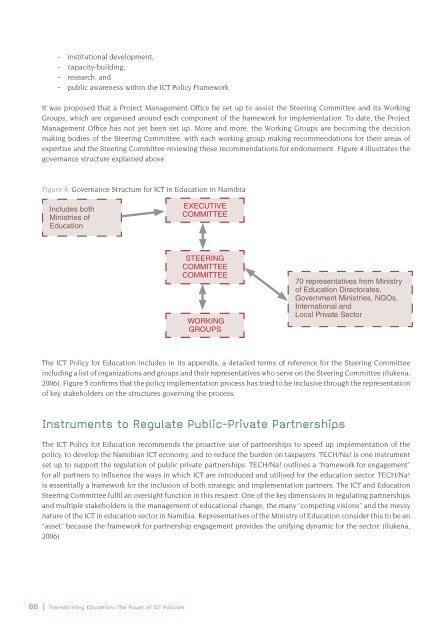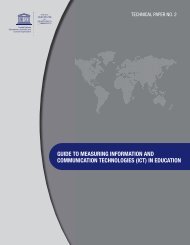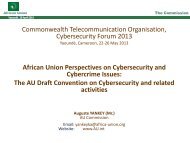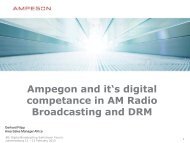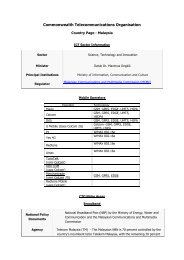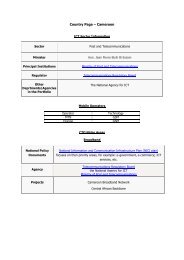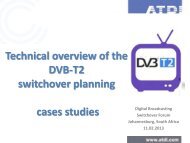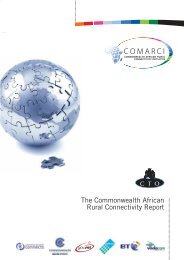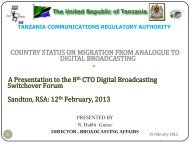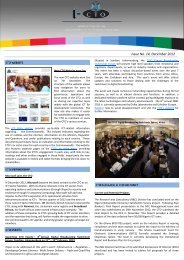Transforming education: the power of ICT policies - Commonwealth ...
Transforming education: the power of ICT policies - Commonwealth ...
Transforming education: the power of ICT policies - Commonwealth ...
Create successful ePaper yourself
Turn your PDF publications into a flip-book with our unique Google optimized e-Paper software.
− institutional development,<br />
− capacity-building,<br />
− research, and<br />
− public awareness within <strong>the</strong> <strong>ICT</strong> Policy Framework.<br />
It was proposed that a Project Management Offi ce be set up to assist <strong>the</strong> Steering Committee and its Working<br />
Groups, which are organised around each component <strong>of</strong> <strong>the</strong> framework for implementation. To date, <strong>the</strong> Project<br />
Management Offi ce has not yet been set up. More and more, <strong>the</strong> Working Groups are becoming <strong>the</strong> decision<br />
making bodies <strong>of</strong> <strong>the</strong> Steering Committee, with each working group making recommendations for <strong>the</strong>ir areas <strong>of</strong><br />
expertise and <strong>the</strong> Steering Committee reviewing <strong>the</strong>se recommendations for endorsement. Figure 4 illustrates <strong>the</strong><br />
governance structure explained above.<br />
Figure 4: Governance Structure for <strong>ICT</strong> in Education in Namibia<br />
Includes both<br />
Ministries <strong>of</strong><br />
Education<br />
86 | <strong>Transforming</strong> Education: The Power <strong>of</strong> <strong>ICT</strong> Policies<br />
EXECUTIVE<br />
COMMITTEE<br />
STEERING<br />
COMMITTEE<br />
COMMITTEE<br />
WORKING<br />
GROUPS<br />
70 representatives from Ministry<br />
<strong>of</strong> Education Directorates,<br />
Government Ministries, NGOs,<br />
International and<br />
Local Private Sector<br />
The <strong>ICT</strong> Policy for Education includes in its appendix, a detailed terms <strong>of</strong> reference for <strong>the</strong> Steering Committee<br />
including a list <strong>of</strong> organizations and groups and <strong>the</strong>ir representatives who serve on <strong>the</strong> Steering Committee (Ilukena,<br />
2006). Figure 5 confi rms that <strong>the</strong> policy implementation process has tried to be inclusive through <strong>the</strong> representation<br />
<strong>of</strong> key stakeholders on <strong>the</strong> structures governing <strong>the</strong> process.<br />
Instruments to Regulate Public-Private Partnerships<br />
The <strong>ICT</strong> Policy for Education recommends <strong>the</strong> proactive use <strong>of</strong> partnerships to speed up implementation <strong>of</strong> <strong>the</strong><br />
policy, to develop <strong>the</strong> Namibian <strong>ICT</strong> economy, and to reduce <strong>the</strong> burden on taxpayers. TECH/Na! is one instrument<br />
set up to support <strong>the</strong> regulation <strong>of</strong> public private partnerships. TECH/Na! outlines a “framework for engagement”<br />
for all partners to infl uence <strong>the</strong> ways in which <strong>ICT</strong> are introduced and utilised for <strong>the</strong> <strong>education</strong> sector. TECH/Na!<br />
is essentially a framework for <strong>the</strong> inclusion <strong>of</strong> both strategic and implementation partners. The <strong>ICT</strong> and Education<br />
Steering Committee fulfi l an oversight function in this respect. One <strong>of</strong> <strong>the</strong> key dimensions in regulating partnerships<br />
and multiple stakeholders is <strong>the</strong> management <strong>of</strong> <strong>education</strong>al change, <strong>the</strong> many “competing visions” and <strong>the</strong> messy<br />
nature <strong>of</strong> <strong>the</strong> <strong>ICT</strong> in <strong>education</strong> sector in Namibia. Representatives <strong>of</strong> <strong>the</strong> Ministry <strong>of</strong> Education consider this to be an<br />
“asset” because <strong>the</strong> framework for partnership engagement provides <strong>the</strong> unifying dynamic for <strong>the</strong> sector. (Ilukena,<br />
2006)


